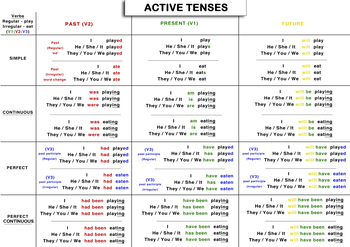TENSES CHART TENSE FORM USE TIME EXPRESSIONS Simple Present A: He goes. N: He doesn’t go Q: Does he go?. Habits and routines: I sometimes sing in the shower. Facts: We like ice-cream. Facts which are always true: Asturias is in the north of Spain. Planned future action set by a timetable or schedule: We leave London at eight next Tuesday. Feb 20, 2018 Verb Tense Chart. Here are simple explanations of the tenses in English that give the most common use of each tense in English. There are a number of exceptions to the rules, other uses for certain tenses in English and so on. 12 verb tenses chart with examples grammar lesson. This grammar lesson you will learn the 12 Verb Tenses that are in the English language. Tenses are all used to indicate action that has taken place in the past, present, and future. The following two photos will show how and when you can use each of the tenses. The 12 verb tense chart explained. 12 verb tenses chart with examples grammar lesson. This grammar lesson you will learn the 12 Verb Tenses that are in the English language. Tenses are all used to indicate action that has taken place in the past, present, and future. The following two photos will show how and when you can use each of the tenses. The 12 verb tense chart explained.
The table below shows a chart of tenses in English. The structure and example of each tense is also given to construct the grammatically correct sentence.

| Tenses | Structure / Formula | Examples |
|---|---|---|
| Simple Past Affirmative | S+V2+… | He read a book yesterday. |
| Simple Past Negative | S+Did+not+V1+… | He did not read a book yesterday. |
| Simple Past Questions | Did+S+V1+…+? | Did he read a book yesterday? |
| Simple Present Affirmative | S+V1+‘s’ or ‘es’+ … | He reads a book daily. |
| Simple Present Negative | S+Do/Does+not+V1+… | He does not read a book daily. |
| Simple Present Questions | Do/Does+S+V1+…+? | Does he read a book daily? |
| Simple Future Affirmative | Will/Shall+V1+… | He will read a book tomorrow. |
| Simple Future Negative | S+Will/Shall+not+V1+… | He will not read a book tomorrow. |
| Simple Future Questions | Will/Shall+S+V1+…+? | Will he read a book tomorrow? |
| Past Progressive Affirmative | S+was/were + (V1+ ‘ing’)+… | He was reading a book yesterday. |
| Past Progressive Negative | S+was/were + not+ (V1+ ‘ing’)+… | He was not reading a book yesterday. |
| Past Progressive Question | Was/were+S+ (V1+ ‘ing’)+…+? | Was he reading a book yesterday? |
| Present Progressive Affirmative | S+is/am/are + (V1+ ‘ing’)+… | He is reading a book. |
| Present Progressive Negative | S+is/am/are + not+ (V1+ ‘ing’)+… | He is not reading a book. |
| Present Progressive Question | Is/am/are +S+ (V1+ ‘ing’)+…+? | Is he reading a book? |
| Future Progressive Affirmative | S+Will/Shall+ be+ (V1+’ing’)+… | He will be reading a book tomorrow. |
| Future Progressive Negative | S+Will/Shall + not+ be+(V1+’ing’)+… | He will not be reading a book tomorrow. |
| Future Progressive Question | Will/Shall+S+ be+(V1+’ing’)+…+? | Will he be reading a book tomorrow? |
| Past Perfect Affirmative | S+Had + V3+… | He had read a book. |
| Past Perfect Negative | S+Had+not+V3+… | He had not read a book. |
| Past Perfect Question | Had+S+V3+…+? | Had he read a book? |
| Present Perfect Affirmative | S+has/have+V3+… | He has read a book. |
| Present Perfect Negative | S+Has/have+not+V3+… | He has not read a book. |
| Present Perfect Question | Has/have+S+V3+…+? | Has he read a book? |
| Future Perfect Affirmative | S+Will/Shall have +V3+… | He will have read a book. |
| Future Perfect Negative | S+Will/Shall+not+ have +V3+… | He will not have read a book. |
| Future Perfect Question | Will/Shall+S+have +V3+…+? | Will he have read a book? |
| Past Perfect Progressive Affirmative | S+had+been + (V1+ing)+… | He had been reading a book since morning. |
| Past Perfect Progressive Negative | S+had+not+been +(V1+ing)+… | He had not been reading a book since morning. |
| Past Perfect Progressive Question | Had +S+been+ (V1+ing)+…+? | Had he been reading a book since morning? |
| Present Perfect Progressive Affirmative | S+has/have+been+ (V1+ing)+… | He has been reading a book since morning. |
| Present Perfect Progressive Negative | S+has/have +not+ been + (V1+ing)+… | He has not been reading a book since morning. |
| Present Perfect Progressive Question | Has/have+S+been + (V1+ing)+…+? | Has he been reading a book since morning? |
| Future Perfect Progressive Affirmative | S+will/shall have + been+(V1+ing)+… | He will have been reading a book since morning. |
| Future Perfect Progressive Negative | S+will/shall+not+have +been+(V1+ing)+… | He will not have been reading a book since morning. |
| Future Perfect Progressive Question | Will/shall+S+have+ been+(V1+ing)+…+? | Will he have been reading a book since morning? |
S = Subject
V1 (1st form of verb) = Base Form
V2 (1nd form of verb) = Past
V3 (3r form of verb) = Past Participle
… = Rest of the sentence
Chart Of English Tenses In Spanish
Read also: Verb tenses explained with examples